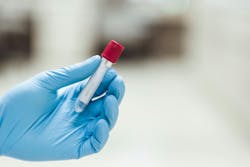Clinical study of a blood test shows 83% accuracy for detecting colorectal cancer
A blood test intended for screening for colorectal cancer in people who are of average risk and not experiencing symptoms correctly detected colorectal cancer in 83% of people confirmed to have the disease, according to a study published March 14 in the New England Journal of Medicine.
The accuracy rate for colorectal cancer is similar to at-home stool tests used for early detection of colorectal cancer.
The findings come from the ECLIPSE study, a multisite clinical trial of nearly 8,000 people ages 45 to 84 led and funded by Guardant Health. The ECLIPSE study compared Guardant’s Shield blood test to colonoscopy, which is the current gold standard for colorectal cancer screening.
The Shield test detects colorectal cancer signals in the blood from DNA that is shed by tumors, which is called circulating tumor DNA (ctDNA). ctDNA is also being used in “liquid biopsy” tests used for monitoring for cancer recurrence in people who have been treated for cancer and for other emerging cancer screening tests.
Of the 7,861 people included in the NEJM report, 83.1% of the participants with colorectal cancer confirmed by colonoscopy had a positive blood test for ctDNA and 16.9% had a negative test — in which a colonoscopy showed colorectal cancer but the ctDNA test did not. The test was most sensitive for colorectal cancers, including early stage cancers, and was less sensitive for advanced precancerous lesions, which can turn into cancer over time.

